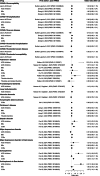Systematic review of Mendelian randomization studies on antihypertensive drugs
- PMID: 39567981
- PMCID: PMC11580643
- DOI: 10.1186/s12916-024-03760-x
Systematic review of Mendelian randomization studies on antihypertensive drugs
Abstract
Background: We systematically reviewed Mendelian randomization (MR) studies and summarized evidence on the potential effects of different antihypertensive drugs on health.
Methods: We searched PubMed and Embase for MR studies evaluating the effects of antihypertensive drug classes on health outcomes until 22 May 2024. We extracted data on study characteristics and findings, assessed study quality, and compared the evidence with that from randomized controlled trials (RCTs).
Results: We identified 2643 studies in the search, of which 37 studies were included. These studies explored a wide range of health outcomes including cardiovascular diseases and their risk factors, psychiatric and neurodegenerative diseases, cancer, immune function and infection, and other outcomes. There is strong evidence supporting the protective effects of genetically proxied antihypertensive drugs on cardiovascular diseases. We found strong protective effects of angiotensin-converting enzyme (ACE) inhibitors on diabetes whereas beta-blockers showed adverse effects. ACE inhibitors might increase the risk of psoriasis, schizophrenia, and Alzheimer's disease but did not affect COVID-19. There is strong evidence that ACE inhibitors and calcium channel blockers (CCBs) are beneficial for kidney and immune function, and CCBs showed a safe profile for disorders of pregnancy. Most studies have high quality. RCT evidence supports the beneficial effects of ACE inhibitors and CCBs on stroke, diabetes, and kidney function. However, there is a lack of reliable RCTs to confirm the associations with other diseases.
Conclusions: Evidence of the benefits and off-target effects of antihypertensive drugs contribute to clinical decision-making, pharmacovigilance, and the identification of drug repurposing opportunities.
Keywords: ACE inhibitors; Antihypertensive drugs; Beta-blockers; Calcium channel blockers; Mendelian randomization; Systematic review.
© 2024. The Author(s).
Conflict of interest statement
Declarations. Ethics approval and consent to participate: Not applicable. Consent for publication: Not applicable. Competing interests: The authors declare no competing interests.
Figures





Similar articles
-
First-line drugs inhibiting the renin angiotensin system versus other first-line antihypertensive drug classes for hypertension.Cochrane Database Syst Rev. 2018 Nov 14;11(11):CD008170. doi: 10.1002/14651858.CD008170.pub3. Cochrane Database Syst Rev. 2018. Update in: Cochrane Database Syst Rev. 2023 Jul 13;7:CD008161. doi: 10.1002/14651858.CD008161.pub3. PMID: 30480768 Free PMC article. Updated.
-
The causal relationship between antihypertensive drugs and depression: a Mendelian randomization study of drug targets.Front Endocrinol (Lausanne). 2024 Aug 9;15:1411343. doi: 10.3389/fendo.2024.1411343. eCollection 2024. Front Endocrinol (Lausanne). 2024. PMID: 39184138 Free PMC article.
-
Using Mendelian randomization study to assess the renal effects of antihypertensive drugs.BMC Med. 2021 Mar 26;19(1):79. doi: 10.1186/s12916-021-01951-4. BMC Med. 2021. PMID: 33766008 Free PMC article.
-
First-line diuretics versus other classes of antihypertensive drugs for hypertension.Cochrane Database Syst Rev. 2023 Jul 13;7(7):CD008161. doi: 10.1002/14651858.CD008161.pub3. Cochrane Database Syst Rev. 2023. PMID: 37439548 Free PMC article. Review.
-
The risk of common hypoglycemic and antihypertensive medications and COVID-19: A 2-sample Mendelian randomization study.Medicine (Baltimore). 2024 Feb 9;103(6):e36423. doi: 10.1097/MD.0000000000036423. Medicine (Baltimore). 2024. PMID: 38335406 Free PMC article.
Cited by
-
Association Between Cardiometabolic Index and Blood Pressure: A Cross-Sectional Analysis of the NHANES 2015-2018 Data.Rev Cardiovasc Med. 2025 May 20;26(5):37359. doi: 10.31083/RCM37359. eCollection 2025 May. Rev Cardiovasc Med. 2025. PMID: 40475721 Free PMC article.
-
Associations between NETosis-related genes and 28-day mortality in patients with sepsis: An observational retrospective study and bioinformatic analysis.Sci Prog. 2025 Jul-Sep;108(3):368504251374929. doi: 10.1177/00368504251374929. Epub 2025 Sep 1. Sci Prog. 2025. PMID: 40888582 Free PMC article.
References
-
- Brownstein DJ, Salagre E, Köhler C, Stubbs B, Vian J, Pereira C, Chavarria V, Karmakar C, Turner A, Quevedo J, et al. Blockade of the angiotensin system improves mental health domain of quality of life: a meta-analysis of randomized clinical trials. Aust N Z J Psychiatry. 2018;52(1):24–38. - PubMed
Publication types
MeSH terms
Substances
LinkOut - more resources
Full Text Sources
Medical
Miscellaneous

